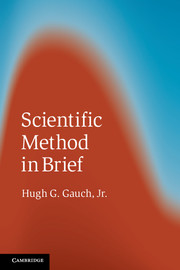Book contents
- Frontmatter
- Contents
- Foreword
- Preface
- 1 Introduction
- 2 Four bold claims
- 3 A brief history of truth
- 4 Science's contested rationality
- 5 Science's presuppositions
- 6 Science's powers and limits
- 7 Deductive logic
- 8 Probability
- 9 Inductive logic and statistics
- 10 Parsimony and efficiency
- 11 Case studies
- 12 Ethics and responsibilities
- 13 Science education
- 14 Conclusions
- References
- Index
3 - A brief history of truth
Published online by Cambridge University Press: 05 November 2012
- Frontmatter
- Contents
- Foreword
- Preface
- 1 Introduction
- 2 Four bold claims
- 3 A brief history of truth
- 4 Science's contested rationality
- 5 Science's presuppositions
- 6 Science's powers and limits
- 7 Deductive logic
- 8 Probability
- 9 Inductive logic and statistics
- 10 Parsimony and efficiency
- 11 Case studies
- 12 Ethics and responsibilities
- 13 Science education
- 14 Conclusions
- References
- Index
Summary
This chapter's history of the conceptions of truth covers 23 centuries in about as many pages. Such extreme brevity allows only four stops, each separated by several centuries: Aristotle around 350 bc, Augustine around ad 400, several scholars in the fledgling medieval universities of Paris and Oxford in the 1200s, and philosopher-scientists of the past several centuries until 1960. Subsequent developments are deferred to the next chapter. This history focuses specifically on truth about the physical world, that is, scientific truth.
For many scientists, their research frontiers are moving so rapidly that most relevant work comes from the past several years. However, this book's topic of scientific method is different from routine scientific research in having a far greater debt to history and benefit from history. Concepts of truth, objectivity, rationality, and method have been around for quite some time. Consequently, great minds from earlier times still offer us diverse perspectives and penetrating insights that can significantly improve our chances of arriving at rich and productive solutions. Also, current thinking and debates about scientific method can be better understood in the light of science's intellectual history.
- Type
- Chapter
- Information
- Scientific Method in Brief , pp. 34 - 52Publisher: Cambridge University PressPrint publication year: 2012

